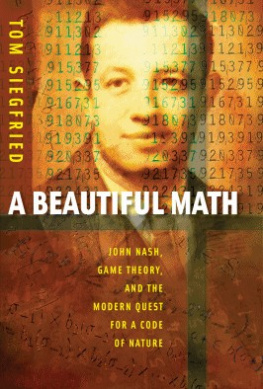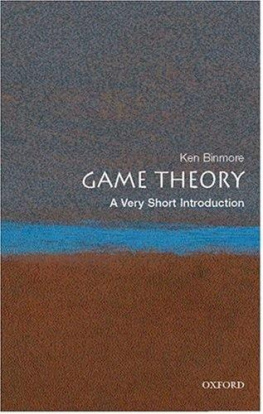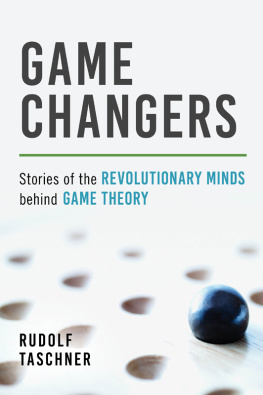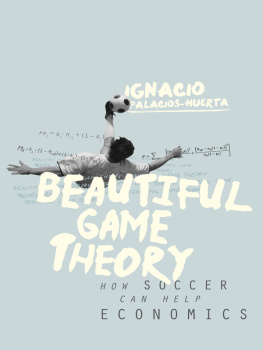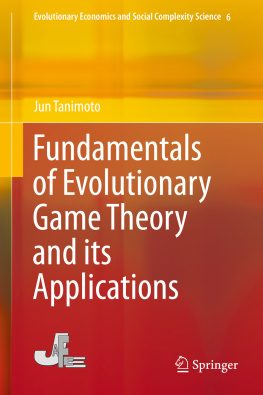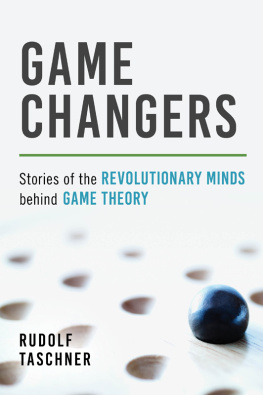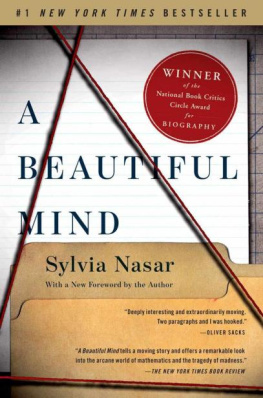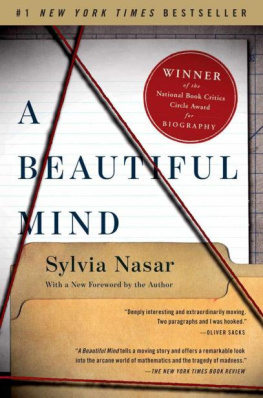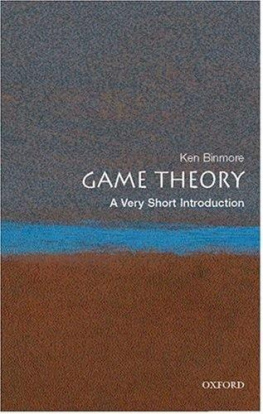Joseph Henry Press
500 Fifth Street, NW
Washington, DC20001
The Joseph Henry Press, an imprint of the National Academies Press, was created with the goal of making books on science, technology, and health more widely available to professionals and the public. Joseph Henry was one of the founders of the National Academy of Sciences and a leader in early American science.
Any opinions, findings, conclusions, or recommendations expressed in this volume are those of the author and do not necessarily reflect the views of the National Academy of Sciences or its affiliated institutions.
Library of Congress Cataloging-in-Publication Data
Siegfried, Tom, 1950-
A beautiful math : John Nash, game theory, and the modern quest for a code of nature / Tom Siegfried. 1st ed.
p. cm.
Includes bibliographical references and index.
ISBN 0-309-10192-1 (hardback) ISBN 0-309-65928-0 (pdfs) 1. Game theory. I. Title.
QA269.S574 2006
519.3dc22
2006012394
Copyright 2006 by Tom Siegfried. All rights reserved.
Printed in the United States of America.
Copyright 2008/2009 Mobipocket.com. All rights reserved.
Reader's guide
This ebook has been optimized for MobiPocket PDA.
Tables may have been presented to accommodate this Device's Limitations.
Table content may have been removed due to this Device's Limitations.
Image presentation is limited by this Device's Screen resolution.
All possible language characters have been included within the Font handling ability of this Device.
Preface
Shortly after 9/11, a Russian scientist named Dmitri Gusev proposed an explanation for the origin of the name Al Qaeda. He suggested that the terrorist organization took its name from Isaac Asimov's famous 1950s science fiction novels known as the Foundation Trilogy. After all, he reasoned, the Arabic word "qaeda" means something like "base" or "foundation." And the first novel in Asimov's trilogy, Foundation, apparently was titled "al-Qaida" in an Arabic translation.
In Asimov's books, "Foundation" referred to an organization dedicated to salvaging a decaying galactic empire. The empire was hopeless, destined to crumble into chaos, leaving civilization in ruins for 30,000 years. Foreseeing the inevitability of the empire's demise, one man devised a plan to truncate the coming era of darkness to a mere millennium. His strategy was to establish a "foundation" of scholars who would preserve human knowledge for civilization's eventual rebirth.
At least that's what he told the empire's authorities.
In fact, Asimov's hero, a mathematician named Hari Seldon, created a community of scientists devoted to manipulating the future. Seldon actually formed two foundationsone in a remote but known locale (sort of like Afghanistan), the other in a mystery location referred to only with riddles. Foundation I participated openly in the affairs of the galaxy. Foundation II operated surreptitiously, intervening at key points in history to nudge events along Seldon's chosen path.
Seldon's plan for controlling human affairs was based on a mathematical system that he invented called psychohistory. It enabled Seldon to predict political, economic, and social trends; foresee the rise and fall of governments; and anticipate the onset of wars and periods of peace.
I don't think Osama bin Laden is Hari Seldon. But it's not so far-fetched to believe that the organizers of the real Al Qaeda perceived Western civilization as an empire in decay. Or that they anointed themselves as society's saviors, hoping to manipulate events in a way that would lead to a new world order more to their liking. So perhaps they adopted some of Hari Seldon's strategies. (Certainly Osama bin Laden's occasional taped messages are eerily similar to Seldon's video appearances from time to time, prepared before his death for delivery decades or even centuries later.)
Of course, any such link to Asimov changes nothing about terrorism. Al Qaeda gains no justification for atrocity from any connection to science fiction. And frankly, the similarities seem rather superficial. Had the terrorists really studied Foundation, they would have noticed Asimov's assertion that "violence is the last refuge of the incompetent."
But in fact, Asimov's series did inspire some real-world imitators: not terrorists, but scientistsscientists seeking the secrets of Hari Seldon's psychohistory. If there is a real-life Hari Seldon, it is not Osama bin Laden, but John Forbes Nash.
Nash's life, chronicled so engagingly by Sylvia Nasar in A Beautiful Mind, is a story of the struggles of a brilliant but troubled man. Nash's math, for which he won a Nobel Prize, is an entirely different tale, still unfolding, about science's struggle to cope with the complexities of collective human behavior.
At the same time Asimov was publishing his Foundation books, Nash was publishing papers establishing foundational principles for a science called game theory. Game theory is the science of strategy; its formulas tell you what choices to make to get the best deal you can get when interacting with other people. Originally formulated to be applied to economics, game theory has now infiltrated nearly every field of modern science, especially those concerned with human nature and behavior. It has begun to establish links with the physical sciences as well, and ultimately, I suspect, it will forge a merger of all the sciences in the spirit of Asimov's psychohistory. At least that is the prospect that I explore in this book.
Game theory is a rich, profound, and controversial field, and there is much more to it than you could find in any one book. What follows is in no way a textbook on game theory. Nor do I attempt to give any account of its widespread uses in economics, the realm for which it was invented, or the many variants and refinements that have been developed to expand its economic applications. My focus is rather on how various manifestations of game theory built on Nash's foundation are now applied in a vast range of other scientific disciplines, with special attention to those arenas where game theory illuminates human nature and behavior (and where it connects with other fields seeking similar insights). I view these efforts in the context of the ancient quest for a "Code of Nature" describing the "laws" of human behavior, a historical precursor to Asimov's notion of psychohistory.
As with all my books, I try to give any interested reader a flavor of what scientists are doing at the frontiers of knowledge, where there are no guarantees of ultimate success, but where pioneers are probing intriguing possibilities. There are scientists who regard some of this pioneering work as at best misguided and at worst a fruitless waste of time. Consequently, there may be objections from traditionalists who believe that the importance of game theory is overstated or that the prospects for a science of society are overhyped. Well, maybe so. Time will tell. For now, the fact is that game theory has already established itself as an essential tool in the behavioral sciences, where it is widely regarded as a unifying language for investigating human behavior. Game theory's prominence in evolutionary biology builds a natural bridge between the life sciences and the behavioral sciences. And connections have been established between game theory and two of the most prominent pillars of physics: statistical mechanics and quantum theory. Certainly many physicists, neuroscientists, and social scientists from various disciplines are indeed pursuing the dream of a quantitative science of human behavior. Game theory is showing signs of playing an increasingly important role in that endeavor. It's a story of exploration along the shoreline separating the continent of knowledge from an ocean of ignorance, and I think it's a story worth telling.

